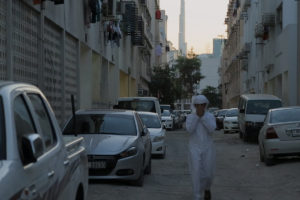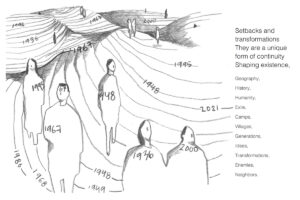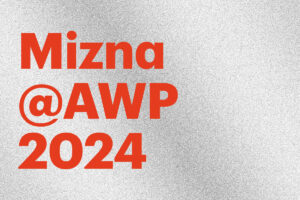
“Fearful Voices” Review: Haunted by Stereotypes
Biographical Info
SOME ARAB AND MUSLIM WRITERS SAY THEY’RE SEEN AS THE USA’S GOBLINS. THEY’RE USING HALLOWEEN TO TRY TO CHANGE THAT PERCEPTION.
Jon Tevlin, Minneapolis Star Tribune
You might see them at your door tonight, begging for candy. Little girls in berqas or boys dressed as Ahab the Arab, with fake beards and daggers.
The Arab as boogeyman is not a new concept, but after the Sept. 11 attacks, some local Arabs and Muslims feel that stereotypes have only increased, fueled by hatred and fear. That’s why Mizna, an organization that promotes Arab-American and Muslim culture, chose Halloween to stage “Fearful Verses; Trapped Between Bush and Bin Laden.”
The event, at 7 p.m. at the Loft Literary Center, 1011 Washington Av. S., Minneapolis, will feature eight Arabs or Muslims reading from their works, many inspired by reactions to Sept. 11. The goal is to expose people to “real” Arabs or Muslims, their intellect and humor.
Here are three of those writers, with a sample of their work. To read the entire works and hear the authors read their works, go to http://www.startribune.com/variety.
Kathryn Haddad, executive director of Mizna and English teacher at Bloomington Kennedy High School:
My father is from Lebanon. He came here to go to college. My mother is of European and Irish descent. Growing up here, I was affected by a lot of things going on in the Middle East, particularly the Lebanese civil war. I had heard these stories of how beautiful Lebanon was, and the pictures I saw on television didn’t match that.
Growing up in Minnesota, I’ve always felt a little different. I remember when I was little, one kid always called me ‘the Hungarian.’ No one knew anything about where I was from. I didn’t get a lot of racist comments directed at me, but because I didn’t look like the stereotypical Arab, I heard a lot of them because people weren’t as careful around me. I remember one teacher saying that all Arabs would wipe themselves with their hands, and all the kids were laughing and saying it was disgusting.
It’s interesting how people I know reacted [after Sept. 11]. Because I work with Arabs and Muslims, I saw very different ways people dealt with it. Some wanted to distance themselves from their past. They changed their names. They didn’t want to rock the boat. Many wanted to fight back against the stereotypes. Others wanted to be quiet, hang a big flag and show everyone we are really good people. Arab-Americans were always aware of a backlash against us, but it really just became more obvious and acceptable after 9/11.
Our organization, Mizna, is an attempt to help Arab-Americans express themselves, something which is very hard to do now. We need to develop our artistic community. For Arabs and Muslims, there is almost no way you can write or create art without dealing with the political. It’s impossible to be a reflective person and not somehow deal with it. How can you write and not be political if you are Arab-American?
I started writing when I was about 8. But I never thought it was any good because none of the stories I read in school was about me. I never thought my story was valid. It wasn’t until I got into graduate school and started reading Arab writers that I thought I could write, too. I finally said, “Hey, where are the stories about me?”
An excerpt from Haddad’s poem “An Arab Halloween Love Poem to You”:
This is not a defensive poem
This is not a political poem
This is not a poem for you to consume to eat
suck down slurp gulp hew gobble
This is not a poem about race, class, imperialism, colonialism,
sexism,
but love
It is a poem about Arab love of self and nation
It is a Halloween poem
To you perhaps
Nahid Khan, promotions for Mizna, journalism masters student, writer:
“I was born in London, England, and lived there until I was 13, then moved to Toronto. When I was 18, I married my husband, who is an American citizen. I got my degree in journalism and then worked as a reporter for the Moscow-Pullman Daily News.
My parents were born in British India, then moved to Pakistan in 1947, when they were very young. The first thing people always ask me in Minnesota is, ‘Where are you from?’ As if it’s the No. 1 defining thing about me. A lot of people will compliment me on my English, which is funny when you think that I grew up in London and my parents grew up in India, which was English-speaking probably 300 years before the United States. I wrote a poem about it called ‘I Speak English, Therefore I Am.’
It’s quite common that when I meet new people they are just convinced I’m somebody exotic: a princess or an ambassador’s daughter or something. I’ve had people ask if I’m from a royal family. It’s people’s stereotype of who we are. They don’t think we are normal, middle-class people. I live a middle-class life. When my parents moved to London, they were penniless. They worked themselves up to a middle-class life, just like everybody else.
Did anything change for me after Sept. 11? Not really, because there was always an underlying, barely concealed hostility towards Muslims. For many American Muslims, it’s the same thing, just more of it.
I was an election judge for a primary on Sept. 10. Most of the other judges were pretty unfriendly to me. I was wearing a scarf and had a long blue dress on, and they’d make unfriendly remarks about the way I was dressed, like, ‘Aren’t you going to be hot in that?’ When I told one that a little girl had complimented me on my dress, one judge said: ‘You must have reminded her of Halloween.’
I think all my poems are about being negated and trying to deal with that.”
Here is a sample of Khan’s poem “Ode to Scheherazade”:
I don’t have any part in the strange world of Scheherazade:
exhibit A
in the Muslim women’s freak show.
A carnival of conniving queens,
dancing girls and harem slaves,
witches, beggars and fortune-tellers:
gaudy gold jewelry jingling
underneath enveloping veils.
I don’t appreciate Scheherazade rip-offs:
Hollywood movies
from the “Garden of Allah” to “Ishtar”;
television’s “I Dream of Jeannie”;
and those seekers of fantasy identities
_ American belly dancers _
who take Scheherazade as a stage name
Fouzi Slisli, working on a doctorate through Essex University in London, an employee of St. Paul Title Co., board member of Mizna
“I am a native of Morocco. I went to the Essex University in England and did a master’s in drama and started a Ph.D., which I am finishing this year. I have been working with the Arab Defamation League and Mizna, dealing with stereotypes of Arabs and Muslims in America.
I am not an American; it comes down to my whole concept about nationalism and having to identify with a particular country. When I lived in Britain, I felt British, and now living in the U.S. I identify with America. I am happy to go around collecting nationalities wherever I go.
I don’t think I’ve had a ‘worst’ experience here. My best experience is the overwhelming community support I felt after 9/ll, Christians and Jews calling us and the nice people who left cards. It was incredible to see the solidarity of all the communities.
We used to get calls who expressed fears. People who have been in the United States for 20 years but are now scared if they see a police car. These were people known for tolerant and moderate views. Those doing work around Arab culture felt that the work they’d been doing collapsed in one blow.
What do I hope to accomplish in my writing? To help create a bridge between two different cultural traditions and cultural experiences. Showing that we have common grounds, and getting people together around ideas, not countries or creeds.”
Slisli will read a three-part poem that looks at America after 9/11 from three viewpoints: an FBI agent (the arbitrary), an Arab-American and the Arab’s neighbor.
The Arbitrary
I have on my fingertips the power of the arbitrary
And I will not differentiate
I will wiretap your home and eavesdrop on your conversations
I will bug your cars and workplaces and infiltrate your neighborhoods
I will plant ears
And I will listen in on you
I will work my way into your friendships, companionships, camaraderie and associations
I will sift through your life, your loves, your passions
I will rummage through your joys and miseries
I will plant ears
And I will listen in on you
Did you say you like freedom and equality?
Allow me to help you appreciate them.
IF YOU GO
What: Fearful Verses; Trapped Between Bush and Bin Laden.
Where: Loft Literary Center, 1011 Washington Av. S., Minneapolis.
When: 7 p.m. tonight.
Price: $ 5 at the door.










